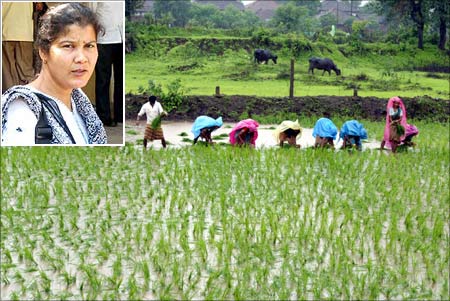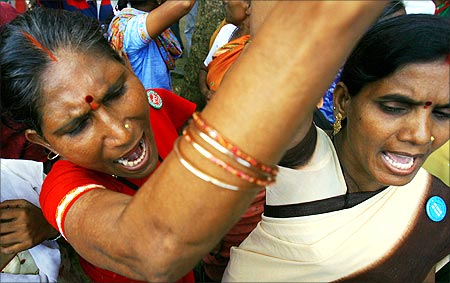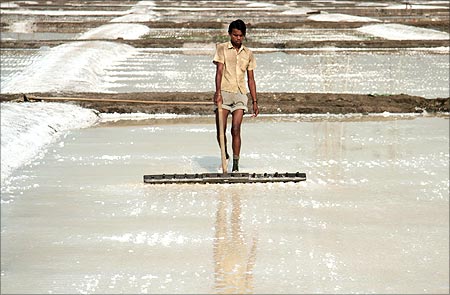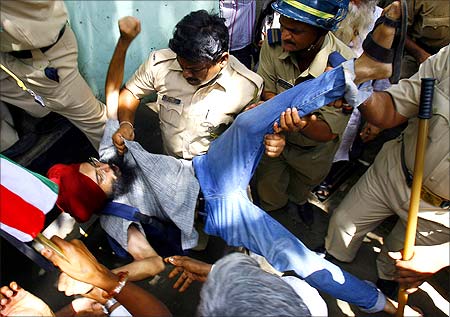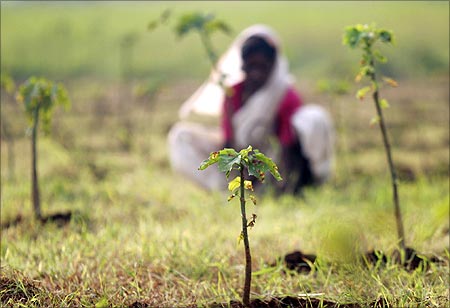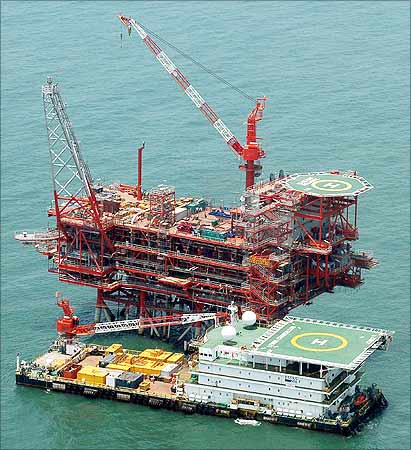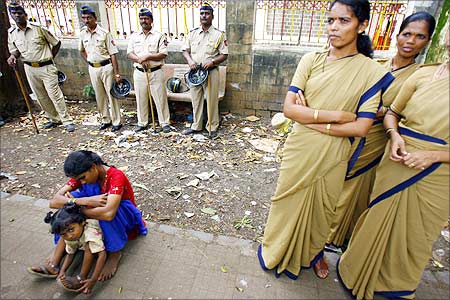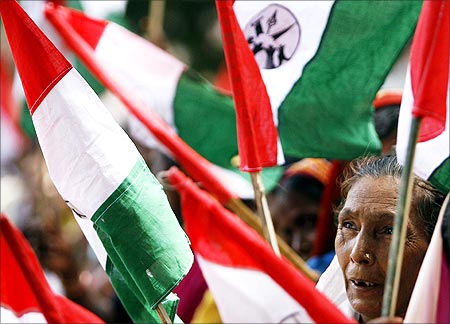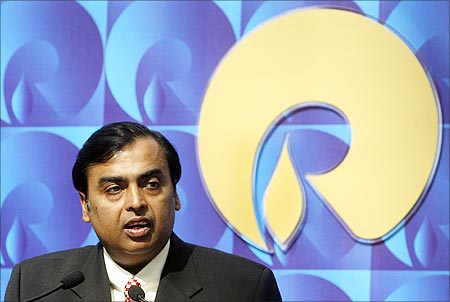 | « Back to article | Print this article |
SEZ story: How farmers won against Ambani
Can you win a grassroots level agitation for your land against a person whose is worth a whopping Rs 196,000 crore (Rs 1,960 billion)?
Yes, you can! At least, in the first round of a long-drawn struggle, farmers of Raigadh, near Mumbai, have won a legal battle for their land against Mukesh Ambani, India's richest man.
Nobody is dubbing it a revolution, but something radical has happened near Mumbai. Ambani, not just the richest but also arguably the most powerful Indian industrialist, has faced a setback due to 'people's power'.
After taking over the Reliance legacy, Dhirubhai Ambani's elder son Mukesh had dreamed of something really Himalayan in size. He dreamt of building a new mega city, port and special economic zone (SEZ) near Mumbai.
The Maharashtra government, as per law, was to acquire the requisite land and hand it over to the Mukesh Ambani-led Reliance Industries. Mukesh's plan -- the Maha Mumbai Special Economic Zone (MMSEZ) -- was co-sponsored by his friend Anand Jain.
There are various versions of the area of the land acquired by Reliance for the mega project. Initially, the company wanted more than 10,000 hectares of land. At one point, MMSEZ claimed it had agreements with 3,800 landowners to acquire 4,800 acres. Even, the Maharashtra government claimed that Reliance had around 5,000 acres of land, whereas as per the rules of SEZ they needed a minimum of 2,500 acres to run a multi-product SEZ.
'We are fighting against one who can buy everything in this country'
The current tussle is over the legal provisions that dictate land acquisition. According to India's Land Acquisition Act, 1894, land needs to be acquired within three years from the date of the publication of a declaration to acquire property for any proposed project. And if no award is made within that time, the entire process for the acquisition of the land would lapse.
The Supreme Court, on June 5, disallowed a plea by MMSEZ to stay the acquisition process so that the deadline limitation could be overcome.
When farmers in Raigadh heard the verdict they burst into cheers and tears of joy, and danced to celebrate.
Reliance claims that they still have time till July 26 to acquire the land. But Raigadh district farmers do not want to part with their ancestral land because it is highly fertile and enjoys a rich cultural heritage.
After July 26, Reliance will have to negotiate directly with farmers and fix the deal at current market prices.
There were many organisations like the Anti-Mumbai Special Economic Zone Action Committee, the 24 Gaon Sangharsh Samiti the Jagatikaran Virodhi Kruti Samiti, the Peasants and Workers Party, the National Alliance of People's Movement, and the Savahara Jan Andolan who put up a strategic fight, which included a hunger strike and a referendum, to counter the equally tactful strategy of the Maharashtra government and Reliance in this battle for land.
Ulka Mahajan, one of the leaders belonging to Savahara Jan Andolan, discusses how and why the battle for land in Raigadh was won in the Supreme Court with the farmers' united effort. Excerpts:
'When they heard the verdict, they burst into tears of joy'
What have you gained from the Supreme Court verdict that disallowed extension of deadline for the Maharashtra government and MMSEZ to acquire land?
It's a big victory for the farmers and the organisations agitating against the SEZ. We had been struggling for the last three years. The Supreme Court judgment has given a lot of relief to the farmers.
With this judgment the entire process of land acquisition will lapse. As of today, no land acquisition process is on. The Maharashtra chief minister (Ashok Chavan) has assured farmers that there will be no forced acquisition of their land.
According to the notification issued earlier, by July 26 2009, the entire process of acquiring land would lapse. If the Ambanis and Reliance want to still go ahead with their proposed SEZ then they will have to re-initiate the entire process.
That would be extremely difficult for them because the amendment to the Land Acquisition Act that is being moved in Parliament states that if the land has to be acquired for a private corporation then 70 per cent of it will have to bought by the corporation on its own through private negotiations. Only then, will the government help the private corporation acquire the remaining 30 per cent of land.
Reliance is trying since 2003 to get land in Raigadh. Till June 2009, they haven't been able to get it. So, even in the future it will be difficult.
Not only here (Raigadh), but wherever the Maharashtra government has acquired land for an SEZ, it will be forced to rethink the strategy.
We look at the Supreme Court judgment as a big victory because we are fighting against the biggest corporate in the country. We are fighting against one who can buy everything in this country.
'95% farmers in Raigadh opposed the Reliance SEZ'
How did you manage this? Did they try to appease you?
They didn't try this trick individually on me. There were so many forces that were acting against Reliance's SEZ. There are political parties, trade unions, NGOs. All of us have come together under the banner of Jagtikaran Virodhi Kruti Samiti (action committee against globalisaiton) to oppose Reliance.
Professor N D Patil of the Peasants and Workers Party was very active and provided strong leadership.
How many farmers are with you?
It is difficult to say in terms of numbers. When we had a referendum on the land issue, 95 per cent of the farmers in Raigadh area opposed it. Acquisition notices were issued to 23,000 families, and of them 95 per cent opposed land-grabbing under the pretext of setting up an SEZ.
'Farmers are aware that SEZ are not in their interests'
What are your major problems, what are the issues you are not ready to compromise?
Farmers are getting affected by this land acquisition. When one farmer is affected, his entire family gets affected. In most cases in India, one farmer is interconnected by his agricultural activities with many more families.
In Raigadh, when one farmer loses land five other families lose a livelihood. They are dependent on agriculture and on the land. There are salt pans, there are animals and horticulture. Compensation is given to only one farmer who owns the land and not to those who have been dependent on the same land for many generations. Those indirectly dependent on the land would be thrown on to the streets.
Second, we oppose the law applicable to SEZs. Some labour laws, especially the State legislation, will not be applicable inside SEZs. The Maharashtra government has prepared this Bill and it is a dangerous Bill.
Third, the amount of tax concessions being offered is unacceptable. Former finance minister P Chidambaram himself had said that due to tax concessions given to SEZ owners, the government would lose close to Rs 1.75 lakh crore (Rs 1.75 trillion)!
Fourth, in the SEZ Act, many existing laws are made or not made applicable merely through a notification. This is undemocratic. The SEZ Act enjoys superceding powers. We have made farmers aware about how and why SEZ are not in theirs or the country's interests.
'Why should farmers give Reliance the land on declining terms?'
What are the reasons that Raigadh farmers are opposing this?
The land that Reliance wants is in and around the Pen, Panvel and Uran areas. This is the most fertile land in the district and is very close to Mumbai. By the sea route, it is only 28 km away from Mumbai. Prices are going up like anything.
Many years ago, (electronics major) Videocon was given land near Mumbai, that was undeveloped, for Rs 1.20 crore (Rs 120 million) per acre. At that time, a revenue minister was ready to resign on the issue. His contention was that the amount was too little.
On the other hand, the Arrow City Manhattan project was coming up near Vadkhal. The government gave farmers Rs 15 lakh (Rs 1.5 million) per acre and now they are building apartments on it. Bookings are open and builders are selling flats for as much as Rs 1.67 crore (Rs 16.7 million) each!
The farmers are now realizing that the assets that he owns are his forefathers' creation. In this area of Raigadh district, the agricultural community is quite aggressive. The land is actually created after generations of effort. The entire area had creeks all around. Farmers built bunds and protected their land.
And now Reliance wants to take away this precious asset permanently. Farmers ask why should they give Reliance the land on declining terms, when the rupee value is on the decline. . .?
Farmers are looking for another option. They will not give away land permanently at all. Also, importantly, all these villages are six feet below the mean sea level. During high tide and monsoons they protect the land by erecting bunds. They have been doing it for generations. If Reliance does any development work here, these villages will not be able to stand the pressure of water.
So far as the MMSEZ goes, nothing has been disclosed about the effect on the villages that are below sea level. Reliance claims that there will be any physical displacement. But, there could be a natural calamity and after that they won't be compensated. People fear that after the man-made disaster they will be thrown out of the area.
Also, people are worried that to develop the MMSEZ on 10,000 hectares of land, the amount of soil, sand and rock that will be required will be so huge that hills and mountains in the area will be exploited. That would be disastrous for the environment.
Farmers say they don't want to follow this path of 'development' which is irreversible.
'Rulers in India are out to finish the agriculture sector'
How did they fight this agitation for so long?
In this entire tract, a homogenous agricultural community resides. This community has a history of struggle. They are strong and they are militant. They have fought many battles against sahukars (moneylenders) and landlords. They fought a big battle under leadership of Babasaheb Ambedkar. Also, not only is the land fertile here, the people are also battle-ready. This community has an unusual fighting spirit.
But there must be some meeting ground between the farmers and Reliance. . .
We would like to discuss with the government, and not with private corporations.
We want to debate our industrial policy. In the Indian context, agriculture and industry have to be supported by each other.
We are not against industries. But rulers in India are out to finish the agriculture sector. This is the only sector that gives employment and food to the entire country. The number of people absorbed by agriculture cannot be absorbed by industries.
Farmers' sacrifice by giving up all they have -- land, water, employment and environment -- is not going to help the country.
The problem with most people is that they are simply not accepting the fact that SEZs are not industrial development. Already hundreds of farmers have given their land to the government and Maharashtra Industrial Development Corporation estates are there all over. . . but none of the MIDC plants have real industries.
Most of the plants here have closed down. When farmers gave land they were promised that they will be given jobs in factories in MIDC, but the land has gone and no jobs have come to them. People who gave land to the Maharashtra government are on the streets of Mumbai. They were literally thrown out without a job. The same land (with MIDC) can be used for SEZs. Why do they want it near Mumbai?
'We will talk with the government, not with Ambani'
Why don't you negotiate with Ambani?
Not with Ambani. That would be wrong practice. He is not the ruler. The chief minister and the finance minister normally discuss policies with them (Reliance). We have always maintained that we don't want to discuss anything with Reliance.
We will talk to the government because it is elected democratically. Why should we also give importance and power to Ambani which our rulers have given them?
In the end which strategy of your agitation worked?
Several strategies worked. We made sure that the struggle remained alive. We had some 40 actions in one year. Youth and women were involved. Reliance tried to manipulate every situation. Even during the festivals they offered certain things, but we discussed everything with the people.
We kept them informed. Our political parties don't have a clear policy. All parties would like to go for SEZ if given a chance.
'In our fight, many times we felt frustrated'
Did you face a low point at any time during your struggle when you thought you will not win?
Not really a low point, but many times we felt frustrated. Former chief minister Vilasrao Deshmukh had assured us three times that they will not go ahead with acquisition and will stop it. But despite the assurance they continued acquisitions.
A parliamentary committee had come here and it gave a clear recommendation against land acquisition; the Reserve Bank of India has also said that in the long run the SEZ strategy is not workable. The Comptroller and Auditor General also asked that the SEZ policy be reviewed. Even the World Bank recently said that SEZs are a flop in India. But the Indian government still wants to go ahead with SEZs. That is frustrating.
Did Reliance try to lure farmers to change their stand?
They tried in some villages. They tried to persuade some farmers, committee members and activists and tried to buy them out. But the core group has some veterans who have fought various struggles throughout their life, so they could not be bought over.
'Reliance has money, but we have people's power'
What is your future?
We have won the biggest battle against Ambani. Now we have more confidence and energy. We will see that ultimately the SEZ Act as it exists today is scrapped. That is our real goal.
But as soon as the Supreme Court gave the verdict, land price crashed in the market. Is this not to the farmers' disadvantage?
Let it (land price) crash. They just don't want to sell their land. Who is worried here? Let Reliance be worried about it.
By your argument, Reliance should be happy. But we are not concerned. See, we are fighting our battle. Reliance has money, but we have people's power. When people are fighting to save their own land they can really go on forever.
You should have seen us when the Supreme Court judgment came. We were extremely happy. People were dancing and distributing sweets. We rejoiced! Everybody in our villages was happy and hopeful.
